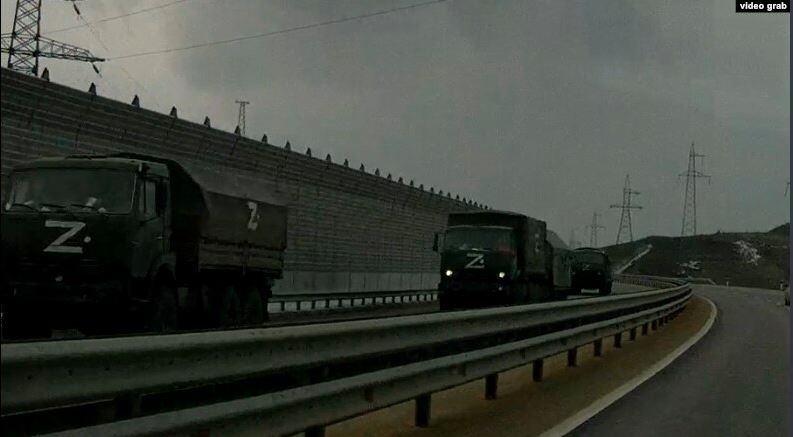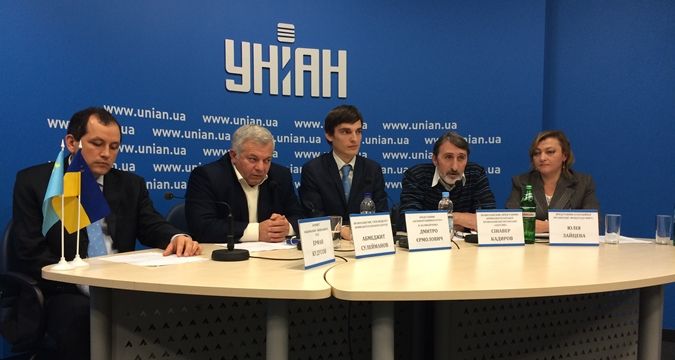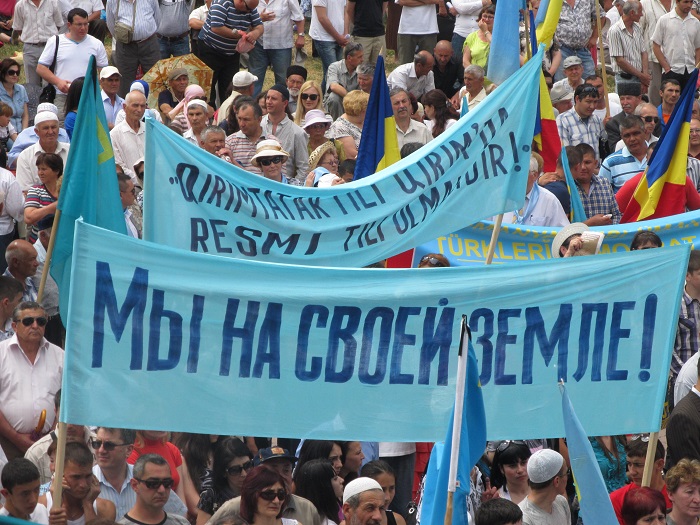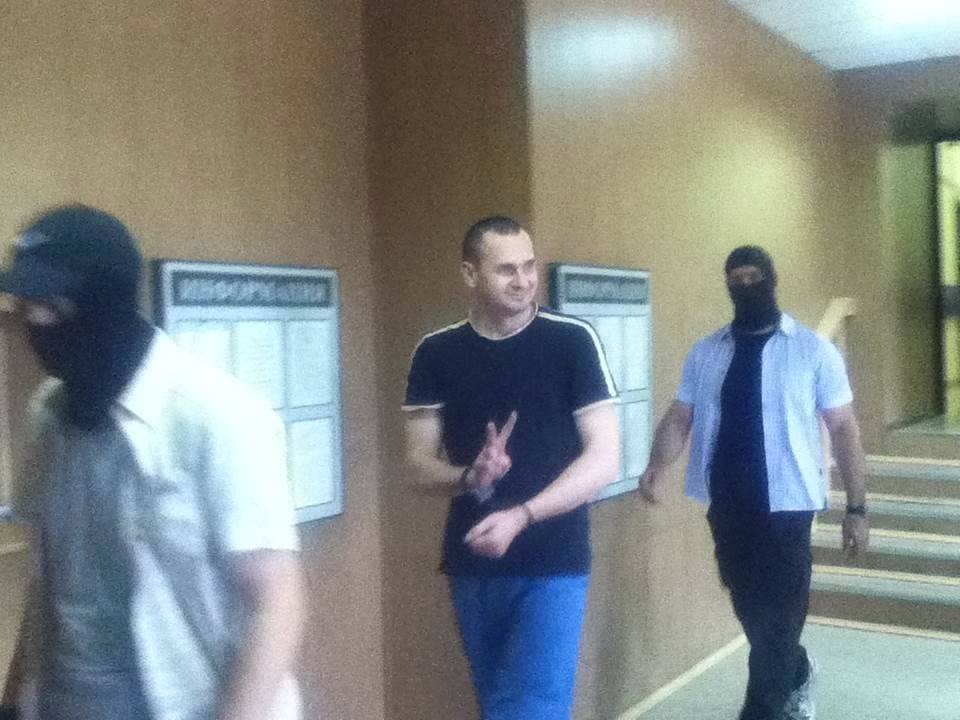Crimea as a military base during Russo-Ukrainian war
Russian military vehicles, ammunition and the remainder of military personnel continues active movement all over the Crimean peninsula, in particular in Simferopol, Bakhchysarai, Feodosia, Dzhankoi, Armyansk, Krasnoperekopsk and other cities.
Every day, especially at night, Sevastopol residents hear missiles that the enemy launches toward Ukrainian cities from the Black Sea.
According to open sources, there are instances when Crimeans conscripted into the Russian armed forces as part of mandatory military service have been involved in the hostilities.
These sources also say that Russia has been coercing conscripts undergoing mandatory service to sign military contracts, or forging such contracts, in order to involve them in the hostilities.
Crimean morgues and hospitals in Crimea remain overcrowded; the enemy continues hiding actual losses from the public.
The Office of the Permanent Representative of the President of Ukraine in Crimea has identified at least 18 burials of Russian soldiers in Crimea, some of them Ukrainian citizens that were illegally drafted into the Russian army and thrown into the war against their own country.
In addition, at least 15 Russian POWs have been confirmed to come from Crimea, most of them presumably Ukrainian citizens.
Internal sources of the Office confirm that the occupying power has been forcibly drafting Crimean Tatar youth into its army right from their homes.
The information obtained from captured Russian soldiers from temporarily occupied Crimea suggests that Russian servicemen in Crimea are exposed to massive levels of propaganda in order to justify Russia’s military aggression and convince them of its "peacekeeper" role. Most soldiers are kept in the dark regarding the actual goals of the war.
The occupants are forming so-called "Crimean and Sevastopol Cossack Districts" to unite Russian paramilitary groups under their flag. Given the heavy losses that the Russian army has suffered in its war against Ukraine, these paramilitary groups could serve as reserves for replenishing Russian troops, or they may be tasked with suppressing civilian resistance in the newly occupied territories.
During the takeover of Crimea in 2014, "Cossack units" were actively involved in abducting and torturing pro-Ukrainian activists on the peninsula and dispersing pro-Ukrainian rallies, as well as were engaged by the occupational forces in patrolling cities to find those opposed to the occupation. Occupational administrations in Crimea have been allocating considerable assets to these units.
Monitoring of media and social networks shows that Russian authorities are preparing a manual on pro-war propaganda in schools.
Crimean history. What you always wanted to know, but were afraid to ask
Political persecution continues against those who speak out against the all-out Russian aggression against Ukraine or so much as claim that the war is a war.
On March 24, in the occupied Crimea, Zair Smedl, head of the Central Election Commission of the Kurultai of the Crimean Tatar People and activist of the Crimean Tatar movement, was unlawfully arrested, his home searched. He is being charged with committing several "administrative offenses" under the law of the occupying power, namely alleged deliberate displaying of "Nazi symbols" and "discrediting the Armed Forces of the Russian Federation."
The latter is a new addition to Russian legislation, introduced after the beginning of Russia’s full-scale invasion of Ukraine and now actively used by the occupational forces in Crimea against any who dare to protest against the war or even refer to the so-called "special operation" as a war in public.
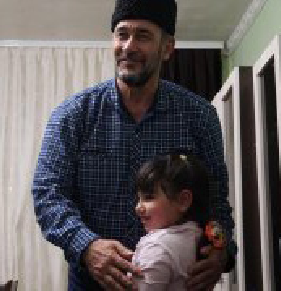
In the end, the occupational court ordered a 2-day detention for Zair Smedl. Earlier, the occupational court in Crimea also detained, only for 15 days, Crimean Tatar human rights activist Abdureshyt Dzhepparov.
Incitement to hatred against the indigenous population of Crimea, Crimean Tatars is gaining momentum. This is a deliberate policy carried out and directed by the occupying administrations of Crimea.
In particular, Vkontakte pages controlled by the occupying administrations have shared posts with personal data of Crimean Tatars who oppose the Russian aggression against Ukraine.
Meanwhile, a number of recent decisions by occupational courts in various Crimean cities concerned local activists that have condemned the war in some way, from Say No to War placards to broken windows in Z-marked cars.
Most of them are facing the aforementioned charge of "discrediting the Armed Forces of the Russian Federation."
The Office has discovered at least 7 such cases. One of these decisions was issued by the Yalta occupational court against Olena Gukova: the activist was fined 30,000 rubles.
In her speech delivered in the occupational court, which she recorded and made public, Olena argues that Russia’s war in Ukraine is indeed a war and not, as the Russian government claims, a special operation, talks about the heavy shelling of Mariupol and Kharkiv and the death toll and, finally, states that "Russia is now run by a truly fascist regime."
Crimean activist fined for condemning Russian invasion of Ukraine
Russia shells humanitarian corridors from Mariupol to make people flee to Russia-controlled territories, including Crimea. Ukrainians protest while their passports are confiscated
Residents of southern and southeastern cities fleeing heavy shelling by the Russian army and the humanitarian crisis are heading, among other destinations, to the temporarily occupied Crimea, since humanitarian corridors to Ukrainian cities are being shelled. These are mostly people from Kherson Oblast, Berdiansk, and Mariupol. However, while trying to get to a safe haven, they encounter new challenges.
For example, when inspected at checkpoints near Crimea, people are forced to wait in long lines for 20 hours in the cold, some are forced to undress. Many people are questioned. After crossing the administrative border, people entering the temporarily occupied Crimea are required to register. As part of this registration, occupational authorities confiscate their Ukrainian passports and instead provide a so-called "certificate for temporary asylum in Russia." These papers have no legal force in Ukraine or any other civilized country and are not valid IDs.
Russia is using the desperate humanitarian crisis for propaganda, making videos of people allegedly eager to flee Ukraine. Only, it doesn’t always go according to plan.
On March 25, Kherson outlet INzhir Media founded by IDPs from Crimea reported that Ukrainians staged a protest in Dzhankoi where they had been forcibly relocated under the guise of evacuation from Mariupol. They were chanting “Glory to Ukraine! Glory to the heroes!”, singing the Ukrainian anthem and shouting slogans condemning Russia’s invasion. Occupational law enforcement did not respond to this for fear of triggering a clash that could become known outside Crimea and Russia.
To have more troops in the Russo-Ukrainian war, occupational authorities in Crimea are preparing another conscription campaign, scheduled for April
The occupational authorities of Crimea are about to launch the next conscription campaign, which, as has already become tradition, should begin in April. The corresponding Russian President’s decree is expected at the end of March. Already in Crimea (specifically in Sevastopol), briefings for heads of conscription commissions, district military commissioners, and other officials and personnel (including doctors) involved in the conscription campaign have been scheduled for March 29. Furthermore, the Office is getting information that men in Crimea are receiving draft summons and that Crimeans continue being mobilized for war.
Consequently, men of military age are trying to flee the peninsula. As the cost of air travel through Russia is quite expensive and there are just a few options for departure due to sanctions, they choose to travel by car through the territory of Russia to third countries.
Crimean economy continues to deteriorate
Prices of consumer goods are rising.
- In Sevastopol, since February 24, prices have gone up for sugar — by 35%, rice — by 12%, oil — by 12%, butter — by 18%, carrots — by 12%. Prices of hygiene items for babies have risen by about 20%. The occupying power predicts, in restricted documents, a rapid rise in prices for goods and services of up to 65%.
- Russia’s Defense Ministry banned fishing in some traditional fishing areas in Crimea, which has caused a collapse of the local fishing industry.
- In Sevastopol, a leading bakery producer asked the local occupational administration to address the shortage of flour and the rapidly rising cost of raw materials.
- According to the Office’s sources, Russia’s occupational administration in Crimea may attempt to artificially regulate prices by putting pressure on suppliers.
Occupational forces have gained access to water in mainland Ukraine, stealing $1.1 mn worth of water resources every day
Since the start of the full-scale invasion of Ukraine and the conquest of new territories in Ukraine’s south, Russia has resumed water supply to Crimea from mainland Ukraine, which was cut after the peninsula’s occupation in 2014. According to the State Environmental Inspection,
"On February 24, 2022, the aggressor state captured all infrastructure of the North Crimean Canal that controls water supply from the Kakhovka Reservoir of the lower Dnipro River basin to the Crimean peninsula."
By the Inspection’s estimates, Ukraine is losing 32.6 mn ($1.1mn) UAH per day as a result of this unauthorized use of water resources.
Ukrainians are unwilling to give Crimea to the aggressor state
According to a survey conducted by the Sociological Group Rating on March 12-13, the majority of Ukrainians believe that Ukraine should use every opportunity to return the occupied territories of Donbas (86%) and Crimea (80%). This is true for residents of all regions, and this figure is higher now than during the pre-war period.
56% believe that the main goal of Russia’s invasion is the complete eradication of the Ukrainian people, and this opinion prevails in all regions of Ukraine. The rest believe that the goal is to occupy Ukraine and attach it to Russia.
Support for joining NATO has declined somewhat from a record 76% to 72% over the past two weeks. The main reason for this is NATO’s unwillingness to close the sky over Ukraine, which is demanded by almost 90% of Ukrainians.
Ukrainian authorities explained to Crimeans whether service in the occupying army is a crime
The Office of the Permanent Representative of the President of Ukraine in the Autonomous Republic of Crimea which has been operating from mainland Ukraine since 2014, addressed Ukrainians in the occupied Crimea.
According to the clarification, Crimeans that were forced to join the Russian army or other illegal military formations are victims of the armed conflict, not criminals.
Therefore, they may not and will not be subject to criminal prosecution by the Ukrainian authorities. However, if it is proved that a conscript carried out illegal and criminal orders that resulted in civilian casualties or destruction of civilian infrastructure, he will be prosecuted under the appropriate article of the Criminal Code of Ukraine, which entails liability for violating the laws and customs of war.
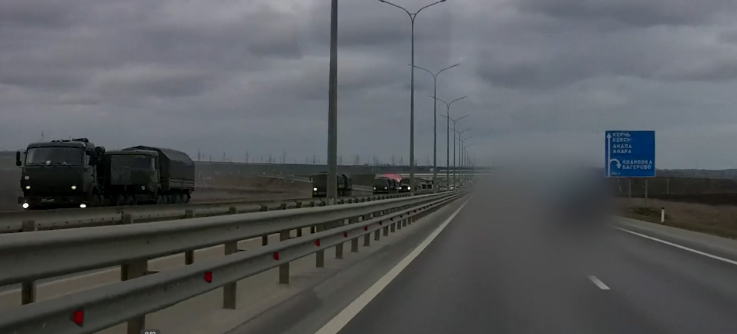
Related:
- Over 80% of Ukrainians want to return occupied Crimea and Donbas; 72% in support of joining NATO – poll
- Russia conceals deaths of Crimean soldiers in Ukraine war amid overcrowded local morgues & hospitals
- Crimean activist fined for condemning Russian invasion of Ukraine

